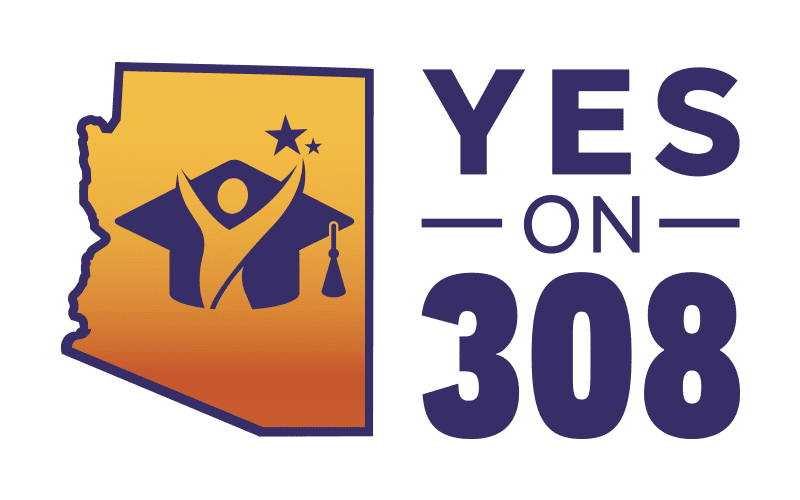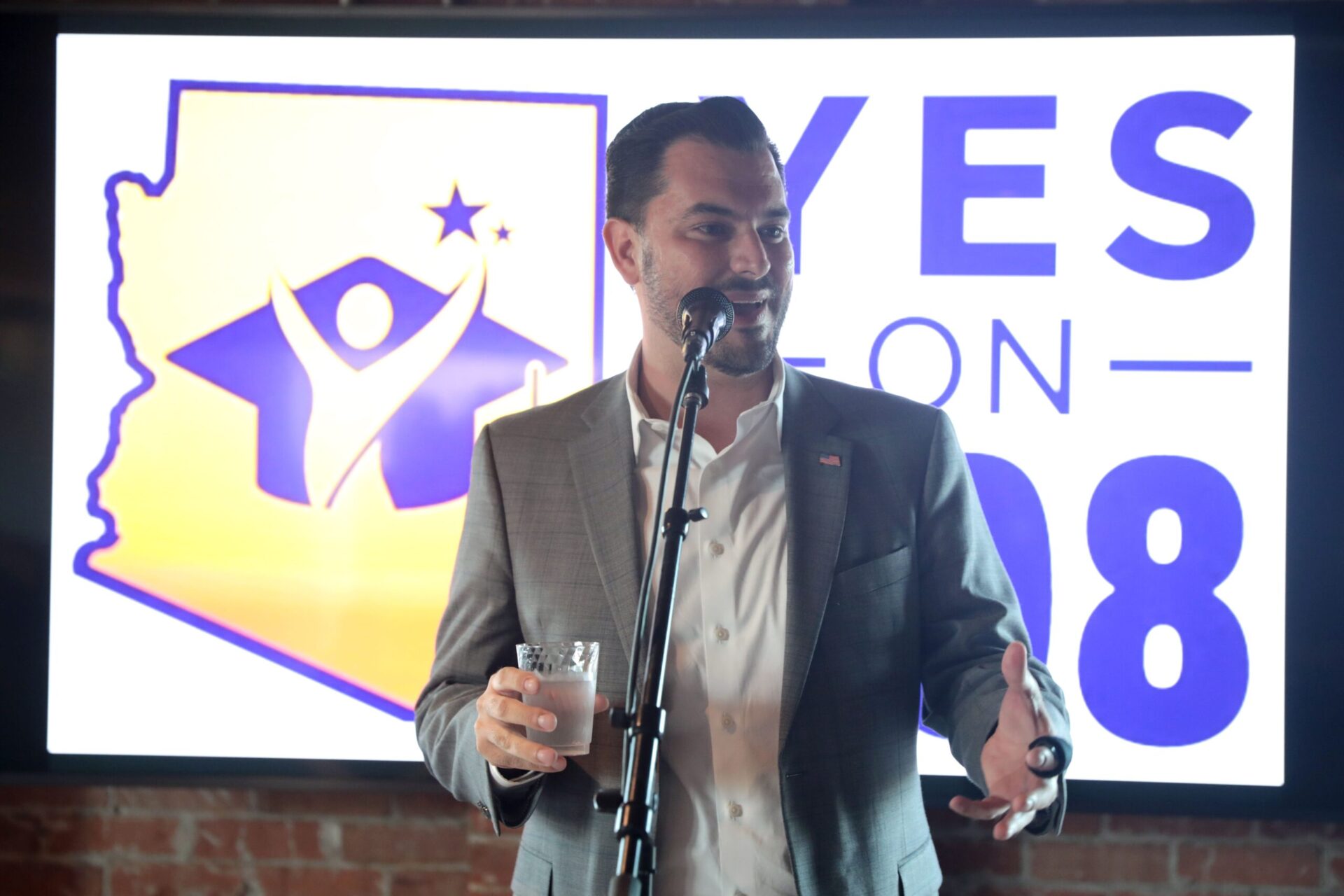Published on the Arizona Republic on July 7, 2022
More than 130 business, community, faith and elected leaders in Arizona kicked off Wednesday a campaign urging Arizona voters to approve Proposition 308 in November.
The statewide ballot measure would allow thousands of Arizona students to continue their education, regardless of their immigration status, at any of the state’s public universities and community colleges.
“Prop. 308 will ensure anyone who has lived in Arizona for two or more years and graduated from an Arizona high school will pay the same tuition rate as the kids that they grew up with,” said Rebecca Shi, the executive director for the American Business Immigration Coalition, which helped launch the Yes on 308 campaign.
The measure would particularly benefit those students who were brought to Arizona as undocumented immigrants when they were children and are known as Dreamers. If approved, Arizona would join 19 other states who already grant in-state tuition to undocumented students.
The name comes from the DREAM Act, a legislative proposal to give them a pathway to citizenship that has failed in Congress numerous times despite overwhelming public support.
Failure to pass the DREAM Act caused then-President Barack Obama to launch the Deferred Action for Childhood Arrivals program in 2012. It shielded DACA recipients from deportation and granted them a two-year work permit.
On Wednesday morning, as advocates launched the Yes on 308 campaign in Arizona, three federal judges with the 5th U.S. Circuit Court of Appeals in New Orleans weighed the legality and the future of the DACA program after former President Donald Trump attempted to rescind it in 2017.
Reyna Montoya is the founder and CEO of the community group Aliento, which played a key role last year in getting Proposition 308 referred to the ballot. She traveled to New Orleans for Wednesday’s hearing because, as a DACA recipient herself, she said she wanted to see what the judges had to say about her fate and the fate of thousands of other DACA recipients.
“I felt that this is like a really critical moment because this is the step before, if the case doesn’t get resolved in a favorable way for us DACA recipients, then it goes to the Supreme Court,” she said. “And there’s a lot at stake. That can mean that my work permit can be taken away and I could be at risk of deportation once again.”
The Arizona Legislature referred Proposition 308 to the ballot in 2021
Proposition 308 made it onto November’s ballot after advocates, including Montoya and her team at Aliento, met with and pressed Arizona lawmakers to pass Senate Concurrent Resolution 1044.
They succeeded in May 2021 with bipartisan support in both chambers of the Legislature.
State Rep. Michelle Udall, R-Mesa, was one the resolution’s cosponsors in the House.
“Getting this referendum on the ballot took a lot of work from courageous leaders on both sides of the aisle,” she said. “It took several years of trying to find the right time and get the votes needed.”
The ballot measure would repeal portions of Proposition 300, a 2006 voter-approved initiative that barred undocumented students in Arizona from receiving in-state tuition. It was part of larger anti-immigrant effort that targeted the state’s undocumented population, culminating in the passage of the controversial immigration enforcement law known as Senate Bill 1070 in 2010.
Tomas Robles with the community advocacy group Living United for Change in Arizona, or LUCHA, said voting in favor of Proposition 308 was an opportunity for Arizona voters to right the wrongs and to continue turning the page from that era.
“Over 10 years ago, Prop. 300, an initiative, passed that robbed Dreamers and Arizona students of the opportunity to pursue higher education and pursue the dreams they so rightfully should’ve been given the opportunity to pursue. This initiative is really about centering those folks,” he said.
Some of those individuals shared their stories Wednesday, including Yesenia Ramales. Her family brought her to Phoenix from Mexico when she was two. Proposition 300 made it difficult for her to continue her education at a public university, so she attended Grand Canyon University instead.
She works as a senior legal assistant at the Florence Immigrant and Refugee Rights Project helping adults and children navigate the complex immigration system, and has aspirations to get a master’s degree or go to law school.
“However, I have had to keep putting things off. Both of these choices have been unreachable to me only because of the price to attend a state school is too expensive for me to afford,” she said.
Under current guidelines set by the Arizona Board of Regents, undocumented students are eligible to pay 150% of in-state tuition, but cannot apply for public scholarships and funding. Proposition 308 would only change their eligibility for in-state tuition.
According to the New American Economy, formerly the American Immigration Council, there are nearly 37,000 DACA-eligible undocumented residents in Arizona, with a total spending power estimated at $618 million.
Supporters of the measure such as Mesa Mayor John Giles also said it made economic sense to continue investing in all Arizona students because an educated workforce would pay off, particularly amid worker and staff shortages nationwide.
“It is very anti-intuitive to be trying to strengthen our workforce and at the same time putting up barriers to these great young Americans who are very anxious to participate in that American dream and to fill these jobs that will contribute to our economy,” Giles said.
Dreamers’ progress is tempered by uncertainty
The progress advocates have made in Arizona, passing SCR 1044 through a Republican-led state House and Senate and under a Republican governor, is tempered by uncertainty about the future of thousands of young undocumented immigrants shielded from deportation nationwide.
According to the nonpartisan Migrant Policy Institute, there are more than 611,000 DACA recipients in the United States, including approximately 23,000 in Arizona. But if the government began to take new applications, MPI estimates that more than 1.1 million undocumented youth would be eligible to apply.
In December 2020, a federal judge in New York ordered the Trump administration to begin accepting new applications under DACA.
However, the state of Texas challenged the legality of the program and in July 2021, a federal judge in that state ruled that the program was unlawful, forcing the federal government to stop taking new applications, although they are still processing renewals for current recipients.
That led to Wednesday’s 5th circuit hearing in New Orleans for oral arguments about DACA.
A decision from that would not only affect current DACA recipients such as Montoya, but also those who are eligible to apply, such as Maria Garcia. She also traveled from Phoenix to New Orleans with Aliento to listen to the oral arguments.
Garcia was too young to qualify for DACA in 2012, but became eligible after graduating from high school in 2020 and submitted her application when the government began taking first-time requests later that year.
She received her biometrics appointment in June 2021, the last step in the process to receive her DACA permit. But the court ruling in Texas the following month that halted all new applications left her in an ongoing state of suspense.
“I just see myself, you know, like almost running through the finish line and like it just keeps extending and extending. And I’m like, I’m getting tired of running to the finish line,” Garcia said.
Montoya and Garcia showed up at 5 a.m. Wednesday to ensure access to the courtroom in New Orleans.
Speaking after oral arguments ended, Montoya said she felt questioning from the judges was more aggressive towards the attorneys defending DACA. She wondered if they had already made up their minds.
Whichever way the judges rule, it’s likely the opposing side will appeal to the Supreme Court, which could then decide the future of DACA. That’s a situation in which Montoya finds little comfort.
“I am not confident that it’s going to have a positive outcome that is going to keep me safe and keep the people I care about safe here in in our country,” she said. “So I’m definitely really worried, and I think that that’s why for us, like, we feel that the only hope that we have is that Congress gets our act together.”
Shi with the American Business Immigrant Coalition said the work that Arizona lawmakers have been doing over the past year to expand access to education to all students, regardless of immigration status, sets an example for Congress.
“We believe that court cases will just add more urgency for the country and for Washington, D.C., to do what Arizonans have already done last year … to ensure that sensible solutions, bipartisan solutions do happen.”


